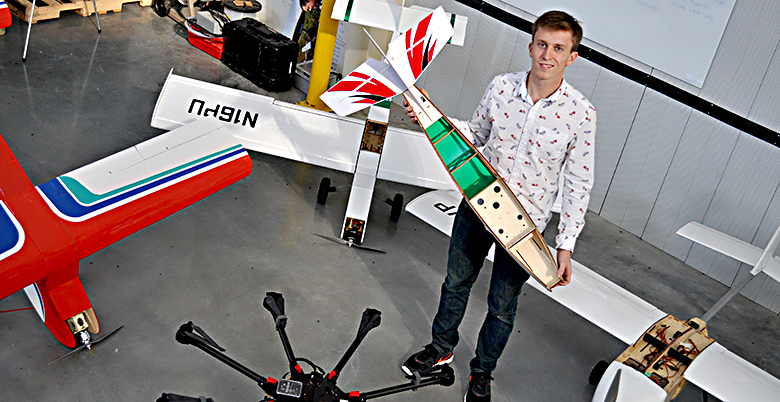
Evan Flatt, an aeronautical engineering technology major, is lending his expertise in unmanned aerial vehicles to a few major research projects across campus.
As a preteen building model airplanes in Portland, Tennessee, Flatt wasn’t aware of the potential for these planes to help collect scientific data. Now he is using his decade-long hobby to collect data for a $6.5 million research project for the U.S. Department of Energy.
“We are trying to automate the phenotyping of sorghum for uses in biofuels,” Flatt said. Phenotyping is the measurement and assessment of a variety of a plant’s traits.
Flatt originally built and modified a model airplane to fly over a sorghum field to collect several types of digital data (hyperspectral, multispectral, lidar, RGB) for the principal researchers. In addition to being the lead pilot for the project, he prepares the 400 images collected during each flight for use by the researchers. That includes correcting the exposure and embedding GPS information for each photo. He is in the process of designing and building a new UAV prototype for use on the project in the future.
His experience on this project has exposed Flatt to a wide range of academic areas and skills.
“It’s a huge boost; I’m learning a lot of skills employers are looking for. I’m building airplanes to fly expensive data gathering equipment. I’m working with systems and knowing what to pay attention to when I integrate cameras with airplanes,” Flatt said. “Working with people is a big part of it. It’s such a diverse group of people. There are experts in aviation, civil engineering, remote sensing, agronomy and plant sciences, data acquisition and management and computer engineering. It’s nice to have experience working with all of these types of people.”
During the summer of 2016, Flatt joined a separate research team for 10 days in Germany for meteorological research in conjunction with two German institutions. It was his first trip overseas. Read more about the project and his experiences.
While he continues his work on the phenotyping project, Flatt is making plans to help a civil engineering professor with a project that will use UAVs to reconstruct accident scenes using lidar. He also is weighing options for starting a career after graduation or applying to graduate school.
